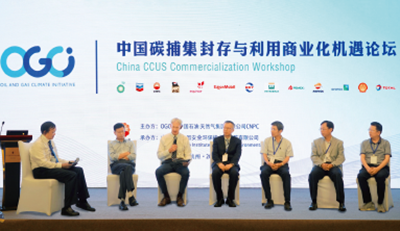The Sahara, which is covered with yellow sand and has an average annual temperature of 30 degrees Celsius, is home to one of the world's hottest countries - Niger, where green land is a luxury.
In 2008, workers of China National Petroleum Corporation (CNPC) came to Niger, bringing not only advanced oil and gas production technology, but also greenery and hope: a grove of rose willow trees and orchards as well as vegetable gardens. After more than 10 years, the rose willow grove has grown into a forest, giving cool shade in summer and fruits in autumn. The forest is now a must-go place for CNPC workers to have a walk after meals and to take photographs.

A view of CNPC workers resting in the rose willow forest in the desert [Photo provided to sasac.gov.cn]
The forest topped with leaves not only gives people some cool comfort, but also plays a role in "cooling" the earth. The trees absorb carbon dioxide, and every 10 square meters of forest or 25 square meters of grassland can absorb all the carbon dioxide exhaled by one person in a day and supply the required oxygen. The thinner the carbon dioxide layer in the atmosphere, the cooler the earth will be.
Covering the whole world: Multilateral cooperation contributes to global development
In December 2015 when the 21st UN Climate Change Conference in Paris was held, CNPC joined in the Oil & Gas Climate Initiative (OGCI), an organization that includes 12 oil and gas enterprises from the US, the UK, France, Norway and the Netherlands whose oil and gas output is 30 percent of the world's total. The organization intends to lead net low-carbon development in the oil and gas industry.

A view at the OGCI China CCUS Commercialization Workshop [Photo provided to sasac.gov.cn]
As the only Chinese enterprise to join the OGCI, CNPC actively participates in oil and gas industry campaigns to fight against climate change. The company not only released the OGCI-CEO Joint Open Letter for two consecutive years, reiterating that OGCI member companies will continue to accelerate corporate carbon-reduction actions and fulfill their own and the OGCI's carbon-reduction commitments, but has also promoted carbon-reduction campaigns in the world transportation industry as an initiating company of the OGCI Transportation Working Group.
On Oct 20, 2020, CNPC organized the "Sustainable Transportation Development Opportunities Forum", at which experts from Tsinghua University, Saudi Aramco, Total Energy and the OGCI delivered speeches.
In July 2020, CNPC and other OGCI member companies jointly released their first carbon intensity target: a reduction of the average carbon intensity from 23kg CO2-eq/bbl in 2017 to 20-21kg CO2-eq/bbl by 2025 in the upstream oil and gas businesses of the member companies. To achieve that goal, CNPC made and released an action plan on methane emission control, and established the China Oil and Gas Enterprises Methane Emission Control Alliance on May 19, 2021, creating a process to realize the carbon-reduction target and forming an effective organizational guarantee.
CNPC participates in and organizes various forms of international exchange activities under the framework of the OGCI, innovates the institutional mechanism, and makes full use of media platforms and channels such as important international conferences and forums, foreign mainstream media, and the media platforms of other OGCI member companies to promote Chinese voices in the fight against climate change, showing the determined actions of Chinese enterprises in addressing climate change.
(Executive editor: Li Zhiyong)